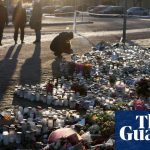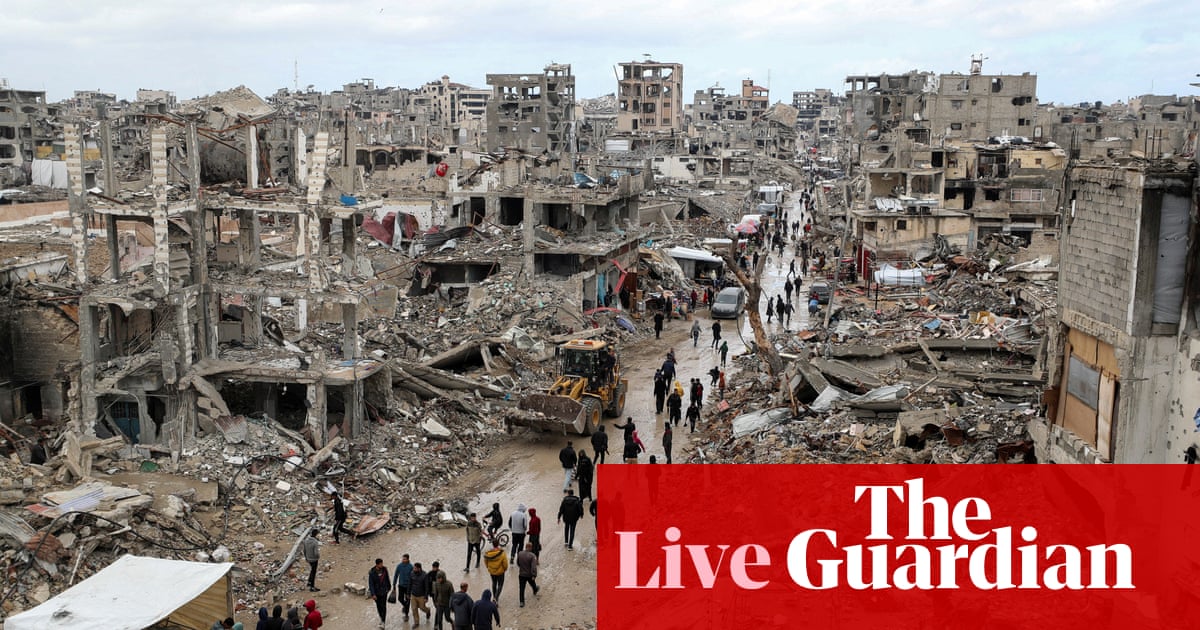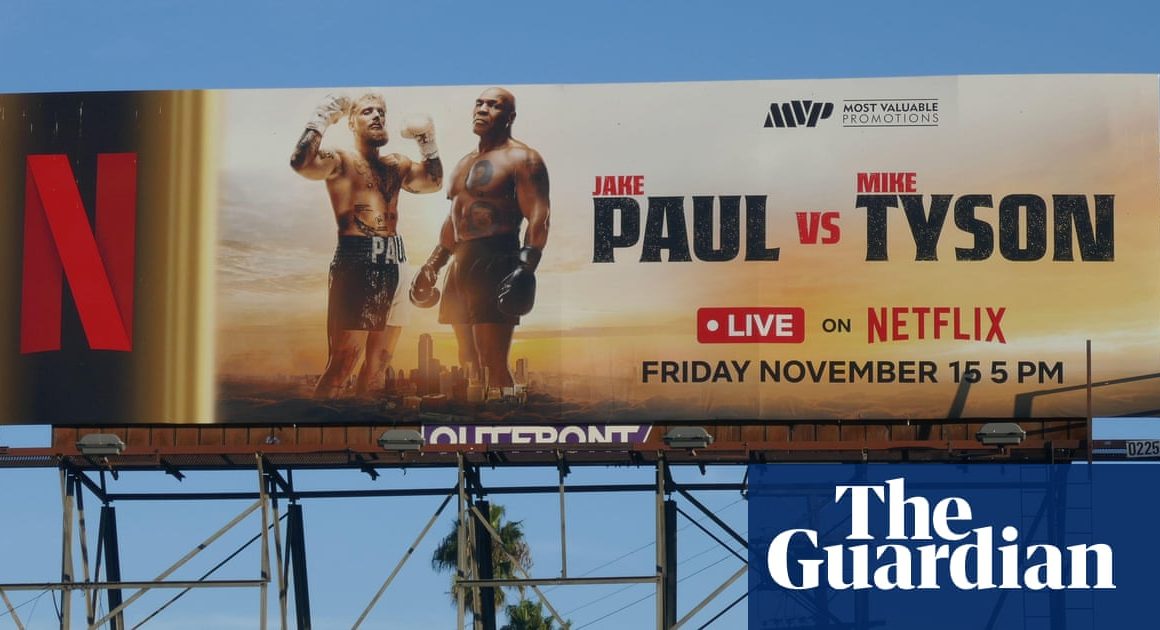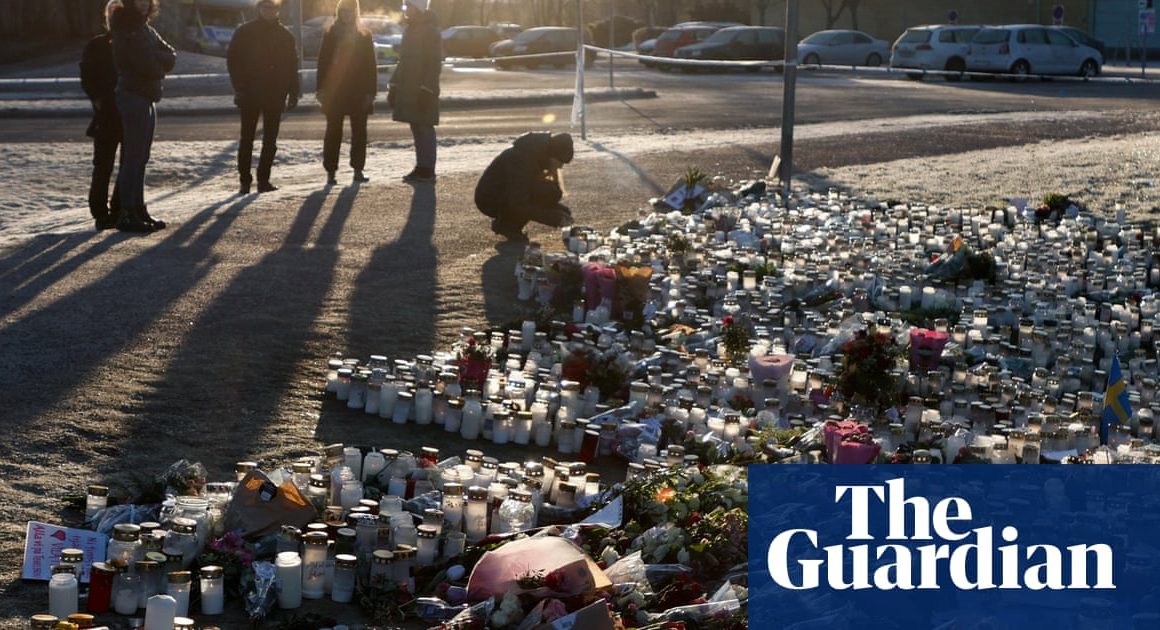UN calls on Washington to reverse ICC sanctions
The United Nations said on Friday it deeply regretted US president Donald Trump’s decision to sign an executive order that authorises aggressive economic sanctions against the international criminal court (ICC) and urged him to reverse the move.
“We deeply regret the individual sanctions announced yesterday against court personnel, and call for this measure to be reversed,” UN human rights office spokesperson Ravina Shamdasani said, reports Agence France-Presse (AFP).
Key events

Andrew Roth
Donald Trump’s plan for Gaza has no cost estimates or budget. There are no troop estimates or outlines in the Pentagon. Even Donald Trump’s allies have admitted that his proposal for the US to “take over” Gaza and for Palestinians to make their homes elsewhere was an idea he had only tinkered with before Tuesday evening, when it tumbled out to the obvious surprise of his closest aides.
One of the very few constituencies to welcome the proposal – which if enacted would amount to the effective ethnic cleansing of the territory – was Israel’s rightwing pro-settler movement and their allies in the US. In these circles there is optimism that the shifting US policy gives the green light to settlement expansion or even the eventual annexation of all the occupied Palestinian territories, including the West Bank.
“What has changed now is that Trump has said that it is US policy to support this as an end goal,” Matt Duss, the executive vice-president at the Center for International Policy, said of the Trump proposal. “And then of course it will just hop over to the West Bank, no question.”
Israel’s pro-settler rightwing immediately hailed Trump’s announcement. Bezalel Smotrich, the country’s ultranationalist finance minister, quoted a biblical passage about the return of Jewish pilgrims to Israel, writing “Thank you President Trump. Together, we will make the world great again.”
Itamar Ben-Gvir, who left Benjamin Netanyahu’s shaky coalition government due to the ceasefire with Hamas, said: “When I said this time and again during the war, that this was the solution to Gaza, they mocked me.”
Under the Biden administration, saying that Gaza had been rendered unliveable would have been seen as a condemnation of Israel’s military campaign. But Trump, ignoring the Israeli assault that has been described as a “domicide” and led to the hollowing out of Gaza’s cities, simply went ahead and said it.
You can read more of Andrew Roth’s analysis piece here:
An Israeli campaign group urged the government on Friday to stick with the Gaza truce ahead of a fifth hostage-prisoner swap, after explosive comments by US president Donald Trump raised questions over the future of the deal, reports Agence France-Presse (AFP).
The scheduled exchange on Saturday comes after Trump declared that the United States would “take over Gaza” and move Palestinians out of the territory, sparking uproar across the Middle East and beyond.
Israel has since ordered its military to prepare for the “voluntary” relocation of Palestinians in Gaza, while Hamas has rejected Trump’s plans as “absolutely unacceptable”.
“An entire nation demands to see the hostages return home … Now is the time to ensure the agreement is completed – until the very last one,” the Hostage and Missing Families Forum said in a statement on Friday.
Since 19 January, Israel and Hamas have completed four swaps as part of the first stage of the Gaza ceasefire agreement. The fifth swap is scheduled for Saturday, but as of now, neither side has disclosed how many hostages Hamas will release or how many prisoners and detainees Israel will free in return.
Amid the uncertainty triggered by Trump’s remarks, Yaela David, whose brother Evyatar is still being held in Gaza, urged “the negotiating team to act today to complete the final details of the deal and ensure the return of all hostages”.
“This must happen under this deal, and if not, there will remain a huge black stain on the history of our state,” she said.
Agence France-Presse has some more detail on the comments by UN human rights office (OHCHR) spokesperson Ravina Shamdasani that we reported on earlier (see 11.10am GMT)
Shamdasani said the international criminal court (ICC) was an essential part of the global human rights infrastructure and that the OHCHR fully supported the independent work of the court, across all situations within its jurisdiction.
The court was “fundamental to ensuring justice and achieving accountability for the most serious crimes, whether committed in Ukraine, Sudan, Myanmar, occupied Palestinian territory, or anywhere else,” she told Agence France-Presse (AFP) in an email.
US president Donald Trump signed an executive order on Thursday saying the ICC in The Hague had “abused its power” by issuing an arrest warrant for Israeli prime minister Benjamin Netanyahu, who held talks with Trump on Tuesday.
Trump ordered asset freezes and travel bans against ICC officials, employees and their family members, along with anyone deemed to have helped the court’s investigations.
“We deeply regret the individual sanctions announced yesterday against court personnel, and call for this measure to be reversed,” said Shamdasani. She added:
The court should be fully able to undertake its independent work – where a state is unwilling or unable genuinely to carry out the investigation or prosecution.
The rule of law remains essential to our collective peace and security. Seeking accountability globally makes the world a safer place for everyone.”
UN calls on Washington to reverse ICC sanctions
The United Nations said on Friday it deeply regretted US president Donald Trump’s decision to sign an executive order that authorises aggressive economic sanctions against the international criminal court (ICC) and urged him to reverse the move.
“We deeply regret the individual sanctions announced yesterday against court personnel, and call for this measure to be reversed,” UN human rights office spokesperson Ravina Shamdasani said, reports Agence France-Presse (AFP).

Emma Graham-Harrison
Palestinians in Gaza responded to Donald Trump’s plans with anger and disbelief, and said they would reject any attempt to force them out.
Many have traumatic family memories of the Nakba, or catastrophe, of 1948, in which about 700,000 Palestinians fled or were expelled from their homes in the war surrounding Israel’s creation, a history that means they are determined to resist further displacement.

Emma Graham-Harrison
Israel’s defence minister has ordered the military to prepare plans to allow Palestinians “who wish to leave” Gaza to exit, after Donald Trump suggested the US take over the territory and resettle its residents in other countries.
A Hamas official attacked the proposal as a “declaration of intent to occupy” Gaza, as Egypt, which Trump named as a possible destination for Palestinians, launched an intense behind-the-scenes diplomatic campaign to block it going further.
Cairo’s envoys warned the US and its allies that it would resist any attempts to move Palestinians across the border, and said the plan threatened its decades-old peace deal with Israel, a template for later regional normalisation deals.
Inside Israel, mainstream political reactions to Trump’s comments have ranged only on a spectrum of approval, with the opposition leader Yair Lapid describing the press conference as “good for the state of Israel” and former defence minister Benny Gantz saying Israel had “nothing to lose” from the proposal.
Their positions reflect popular opinion inside Israel. Eight out of 10 Jewish Israelis support Trump’s call for the “relocation” of Palestinians from Gaza, although only half think it is a practical proposal, according to a poll by the Jewish People Policy Institute.
The only strong opposition to the plan came from a handful of politicians on the far left of Israel’s spectrum; some relatives of hostages still held in Gaza, who said they feared the project could derail the ceasefire deal; and some activists and journalists who echoed international warnings against ethnic cleansing.
“If there were a true opposition in Israel, one with a conscience, a worldview and even some sort of plan for the future, it would’ve raised a loud warning: don’t drink Trump’s potion,” Gur Megiddo wrote in a column for Haaretz.
“The idea of clearing an area of a specific ethnic group, even if it’s a bitter and ruthless enemy, is a concept that Jews – especially the sons of Holocaust survivors like Lapid and Gantz – must never support, no matter the circumstances.”
The US deputy special envoy for the Middle East Friday said that Hezbollah’s presence in Lebanon’s new government was a red line, welcoming the end of the group’s “reign of terror”, reports Agence France-Presse (AFP).
“We have set clear red lines in the United States that they (Hezbollah) won’t be able to terrorise the Lebanese people, and that includes by being a part of the government,” Morgan Ortagus said after meeting Lebanese president Joseph Aoun in Beirut, adding:
The end of Hezbollah’s reign of terror in Lebanon and around the world has started and it’s over”.
The international criminal court (ICC) must be able to pursue its fight against global impunity without hindrance, said European Commission president Ursula von der Leyen on Friday, reports Reuters.
She wrote on X:
The ICC guarantees accountability for international crimes and gives a voice to victims worldwide.
It must be able to freely pursue the fight against global impunity.
Europe will always stand for justice and the respect of international law.”
Anna Betts
Benjamin Netanyahu reportedly gave Donald Trump a “golden pager” during their meeting in Washington DC this week, in an apparent reference to Israel’s deadly attack against Hezbollah in Lebanon last year.
In photos circulating online, the golden pager can be seen mounted on a piece of wood, accompanied by a golden plaque that reads in black lettering: “To President Donald J. Trump, Our greatest friend and greatest ally. Prime Minister Benjamin Netanyahu.”
Israeli media reported that the Israeli prime minister, who is wanted by the international criminal court for war crimes, also gave the US president a regular pager.
The gift was reportedly a nod to Israel’s deadly operation last September against Hezbollah, during which thousands of handheld pager beeper devices and walkie-talkies belonging to Hezbollah detonated simultaneously across Lebanon.
The explosions killed at least 37 people, including children as young as nine years old, and left thousands wounded.
An Israeli official told the Associated Press that upon receiving the golden pager from Netanyahu, Trump, responded: “That was a major operation.”
Here are some of the latest images coming in via the newswires:

Harry Davies
Donald Trump has signed an executive order that authorises aggressive economic sanctions against the international criminal court (ICC), accusing the body of “illegitimate and baseless actions” targeting the US and Israel.
The order grants the US president broad powers to impose asset freezes and travel bans against ICC staff and their family members if the US determines that they are involved in efforts to investigate or prosecute citizens of the US and certain allies.
The hostile action against the ICC comes in response to the court’s decision in November to issue arrest warrants for Benjamin Netanyahu and his former defence minister Yoav Gallant for alleged war crimes and crimes against humanity in Gaza.
In the order, Trump said the ICC had “abused its power” by issuing the warrants which he claimed had “set a dangerous precedent” that endangered US citizens and its military personnel.
“This malign conduct in turn threatens to infringe upon the sovereignty of the United States and undermines the critical national security and foreign policy work of the United States government and our allies, including Israel,” he added.
Neither the US nor Israel are member states of the ICC, a permanent court of last resort for the prosecution of individuals accused of atrocities. In his order, Trump argued the court must “respect the decision” of countries “not to subject their personnel to the ICC’s jurisdiction”.
It was unclear if the Trump administration would announce the names of specific individuals targeted by the sanctions. ICC officials have prepared for sanctions to impact senior figures at the court including its chief prosecutor, Karim Khan.











